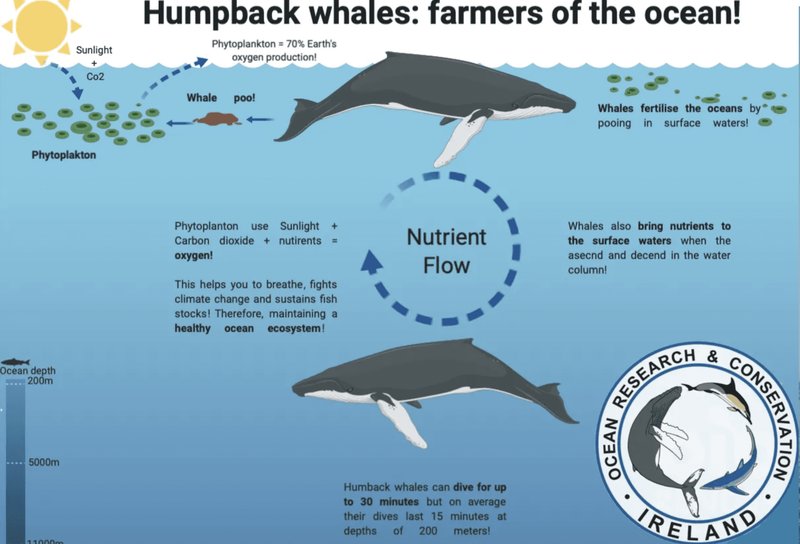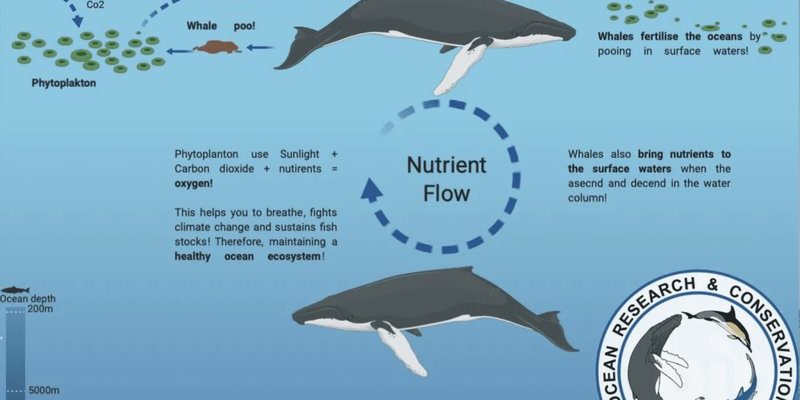
When we think of ecosystems, it’s easy to picture colorful corals, schools of fish, or even the rhythmic sway of seaweed. But what about the larger inhabitants like whales? These magnificent beings affect everything from nutrient cycling to the balance of food webs. Their presence is felt throughout the ocean, and their absence would create a ripple effect, impacting countless species—both big and small.
How Whales Contribute to Ocean Health
Whales play a massive role in maintaining the health of marine ecosystems, largely through their feeding and migration patterns. When they dive deep for food, particularly baleen whales that consume small fish and krill, they stir up nutrients from the ocean floor. This process, called nutrient cycling, is crucial because it brings nutrients to the surface, where smaller organisms like plankton can thrive.
Without these nutrients, the ocean’s food web would struggle. Healthy populations of plankton support a variety of marine life, including fish, which many marine animals and humans rely on for food. In essence, whales enhance productivity in the ocean, creating a stronger base for the entire ecosystem.
The Role of Whale Waste
You might find it surprising, but whale waste is actually a *goldmine* for marine life. Known as “whale fall,” their feces are rich in nutrients and stimulate the growth of phytoplankton. Phytoplankton, the tiny plants in our oceans, absorb carbon dioxide and produce oxygen—just like land plants. This supports not only aquatic life but also contributes to global oxygen levels, proving that whales are essential in combating climate change.
Through their natural processes, whales not only fertilize the ocean but also support a cascade of life, from tiny organisms to large predators. This interconnectedness is a beautiful reminder of how every species plays its part in the broader context of life.
Impact on Food Webs
Let’s break down the food web to see how whales fit into this intricate system. Think of the food web as a giant spider web; if you pull on one strand, it affects the entire structure. Whales are often at the top of the food chain, and their behaviors impact the numbers and health of species below them.
When whales feed, they help regulate fish populations. For instance, by keeping the krill and small fish populations balanced, they ensure that these species don’t overconsume vital resources. This creates a balanced ecosystem where every creature has enough to eat, leading to healthier populations overall.
Predation and Competition
Whales also interact with other predators in the ocean. For example, when a whale hunts, it can create opportunities for scavengers, such as sharks, to benefit from leftover prey. This interplay helps maintain a diverse range of species. If whales were removed from the equation, we might see a disruption in this delicate balance, leading to overpopulation of certain species and decline in others.
In this way, whales contribute to the complexity of marine food webs, ensuring that all species have a chance to thrive.
Whales as Indicators of Ocean Health
Whales are also bioindicators of ocean health. What does that mean? Well, because they are at the top of the food chain, changes in their populations can signal shifts in the ecosystem. If whale numbers decline, it might indicate issues like overfishing, pollution, or climate change affecting their food sources.
Monitoring whale populations gives scientists valuable insights into the health of marine environments. By studying these majestic beings, researchers can understand broader ecological trends and take action to protect marine ecosystems.
Conservation Efforts
Given their vital role, conserving whale populations is crucial. Organizations across the globe are working to protect whales from threats like hunting, habitat loss, and pollution. Initiatives such as marine protected areas and sustainable fishing practices are essential steps in ensuring whales can continue their role in the ecosystem.
You might be wondering how you can help. Supporting conservation groups, reducing plastic usage, and advocating for clean oceans are great ways to contribute. Every small effort counts in the fight to protect these magnificent creatures and the ecosystems they help maintain.
Whales and Climate Change
The ocean is undergoing significant changes due to climate change, and whales are at the forefront of this crisis. As sea temperatures rise and ice melts, the habitats that whales depend on are also changing. This affects their migration patterns and food availability, which can have a cascading impact on marine ecosystems.
Whales help mitigate some of the effects of climate change through their role in carbon cycling. Their massive bodies store significant amounts of carbon, which is released back into the ocean when they die. This process can help regulate atmospheric carbon levels, promoting a healthier planet.
Future of Whales in Our Oceans
The future of whales, and by extension our oceans, depends on how we respond to these ecological challenges. International cooperation is essential to protect migratory routes and maintain healthy ecosystems. By recognizing the whale’s role, we take a step closer to creating a sustainable future for marine life as a whole.
Education and awareness about whales can foster a culture of respect and responsibility towards our oceans. Whether it’s through school programs or wildlife tours, understanding these majestic creatures is the first step towards conservation.
Whales might seem like solitary giants in the vast seas, but their role in marine ecosystems is anything but isolated. They contribute to nutrient cycling, food web dynamics, and even climate regulation. Protecting them goes beyond just saving a magnificent species; it’s about preserving the intricate web of life that they help sustain.
As we continue to learn more about these incredible creatures, it becomes increasingly clear that their presence is vital for a healthy ocean. So, let’s work together to ensure that future generations can marvel at their beauty and recognize their importance in maintaining the balance of our blue planet. Together, we can keep the oceans teeming with life, thanks to the whales that roam their depths.

